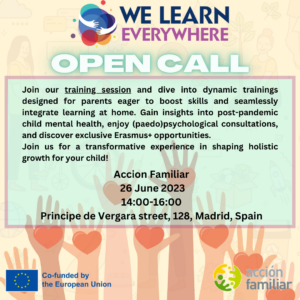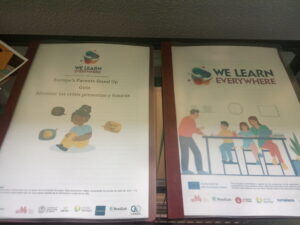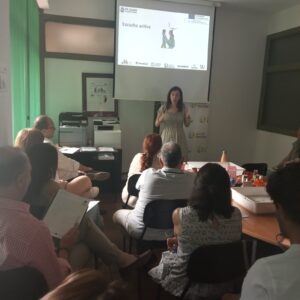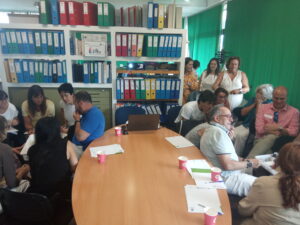Training session in Madrid, Spain
Οn 26 June 2023 WLE partner, Acción Familiar, organised a training session in Madrid.
The training started with a short introduction explaining the We Learn Everywhere project and its objectives:
We began by highlighting the need to talk about what happened during the pandemic and confinement, as it was a unique and disturbing episode on a social level (and in most cases also on an individual level) that we often want to forget about, but which we all lived through intensely and need to “process” and “digest”.
To explore this idea in more depth, we did a dynamic that included the personal experience of each of the participants, who had to answer two questions:
- How did I experience the pandemic?
- What role did I play during the pandemic at the social/family level?
The response to this activity was particularly favourable, as it served to “break the ice” and everyone participated by contributing their point of view, which quickly generated a climate of trust and understanding that was maintained throughout the rest of the workshop.
It was also very enriching to hear the different perspectives and experiences about what happened during the confinement and it was nice for everyone to open up this space for venting and listening.
A return of the interventions was made, followed by a theoretical presentation (always open to questions and interventions from the audience), which broadly covered the following topics:
- The negative part that the pandemic had meant for families and individuals: stress, uncertainty, anxiety, economic hardship etc.
- Self-care and the special need for it in critical moments and when we have to take care of others.
- Self-regulation and heteroregulation: how stress affects our capacities and causes us to end up turning our discomfort on others if we do not manage it properly.
- Resilience: explanation of the concept and the need to develop this skill as a tool for coping and personal growth.
- The need for sincere and open communication as a conflict management technique, highlighting the importance of active listening.
- Stages of the life cycle: explanation of the different stages and some of their respective needs and difficulties.
The training concluded with each of the groups explaining how they had resolved the crisis situation and collecting individual experiences of how they had felt doing the activity and what they had learned from it.
There were some very interesting interventions, as carrying out this dynamic had meant a small “symbolic crisis” for several of them, which helped them to reflect on their attitude in the face of difficulties and the need to work as a team and take advantage of the resources we have instead of focusing on what we lack.
The outcome of the training session was very positive overall, the participants were very happy and participated actively not only in the dynamics but also with interventions and questions, contributing their point of view.
The practical exercises were particularly well received, as they facilitated personal and group reflection and mobilised the participants internally.






